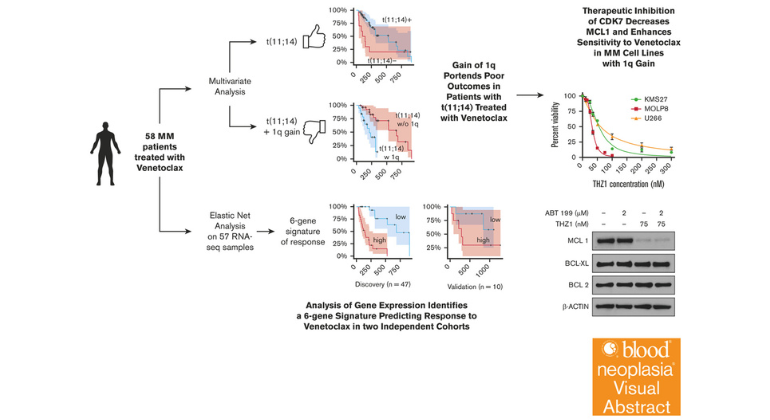Mount Sinai Researchers Identify Six-Gene Pattern to Predict Drug Success in Multiple Myeloma Patients
Genetic markers for venetoclax could help personalize treatment and improve outcomes

Researchers at the Icahn School of Medicine at Mount Sinai have discovered how genetics can affect the success of venetoclax, a treatment for multiple myeloma, a rare type of blood cancer. Their study, “Predictors of Response to Venetoclax and Therapeutic Potential of CDK7 Inhibition in Multiple Myeloma,” published this month in the journal Blood Neoplasia.
This study is the first to look at genetic markers in patients with multiple myeloma who are receiving venetoclax. Venetoclax is a B cell lymphoma 2 (BCL-2) inhibitor that has shown promising results in treating multiple myeloma at Mount Sinai and other institutions, though it is not yet approved by the Food and Drug Administration for this use. Currently, it has been approved to treat adults with chronic lymphocytic leukemia (CLL) or small lymphocytic lymphoma (SLL). The team identified a special six-gene pattern that can help predict which patients are more likely to respond well to the treatment. They also found that using inhibitors of the enzyme CDK7 alongside venetoclax could make the treatment work even better.
Understanding these genetic factors is important because not all patients respond to venetoclax.
“By knowing which patients might benefit the most, we can customize treatments to improve their chances of success,” said corresponding author Alessandro Lagana, PhD, Assistant Professor of Oncological Sciences at the Icahn School of Medicine at Mount Sinai.
The American Cancer Society estimates that in the United States for 2024, about 35,780 new cases of multiple myeloma will be diagnosed (19,520 in men and 16,260 in women), and approximately 12,540 deaths are expected (7,020 in men and 5,520 in women). Although the average lifetime risk of getting multiple myeloma is less than 1 percent—about 1 in 103 for men and about 1 in 131 for women—individual risk can vary based on specific factors.
Multiple myeloma is most common in older adults, with less than 1 percent of cases diagnosed in people younger than 35. The average age of diagnosis is 69.
“Doctors could use genetic testing to choose the best candidates for venetoclax treatment,” Dr. Lagana said. “In addition, combining venetoclax with CDK7 inhibitors might help more patients respond positively, especially those who might not respond well to venetoclax alone. For patients, this research means someday they could receive more personalized treatment plans based on their genetic information, leading to better outcomes.”
Paula Restrepo, a PhD candidate at the Icahn School of Medicine at Mount Sinai, contributed to this research. The study received funding from the ASH Bridge Grant Award and several grants from the NIH NCI; and support from the Multiple Myeloma Center of Excellence Philanthropic Fund.
Next, the research team plans to confirm these findings in larger groups of patients and explore clinical trials that test the combined use of venetoclax and CDK7 inhibitors.
About the Mount Sinai Health System
Mount Sinai Health System is one of the largest academic medical systems in the New York metro area, with 48,000 employees working across seven hospitals, more than 400 outpatient practices, more than 600 research and clinical labs, a school of nursing, and a leading school of medicine and graduate education. Mount Sinai advances health for all people, everywhere, by taking on the most complex health care challenges of our time—discovering and applying new scientific learning and knowledge; developing safer, more effective treatments; educating the next generation of medical leaders and innovators; and supporting local communities by delivering high-quality care to all who need it.
Through the integration of its hospitals, labs, and schools, Mount Sinai offers comprehensive health care solutions from birth through geriatrics, leveraging innovative approaches such as artificial intelligence and informatics while keeping patients’ medical and emotional needs at the center of all treatment. The Health System includes approximately 9,000 primary and specialty care physicians and 11 free-standing joint-venture centers throughout the five boroughs of New York City, Westchester, Long Island, and Florida. Hospitals within the System are consistently ranked by Newsweek’s® “The World’s Best Smart Hospitals, Best in State Hospitals, World Best Hospitals and Best Specialty Hospitals” and by U.S. News & World Report's® “Best Hospitals” and “Best Children’s Hospitals.” The Mount Sinai Hospital is on the U.S. News & World Report® “Best Hospitals” Honor Roll for 2024-2025.
For more information, visit https://www.mountsinai.org or find Mount Sinai on Facebook, Instagram, LinkedIn, X, and YouTube.